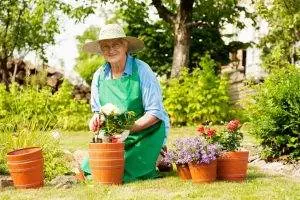After the winter season, the arrival of spring, and the promise of warmer weather, there is an undeniable sense of excitement and anticipation. However, the season of renewal also brings certain challenges, particularly when it comes to garden maintenance.
For tenants, the spring and summer months offer an opportunity to enjoy their outdoor spaces. Whether they want to enhance the beauty of their surroundings or host social gatherings, tenants need to be aware of their responsibilities and limitations when it comes to garden care.

This guide aims to provide a comprehensive overview of garden maintenance for rental properties. From the initial stages of setting the foundation to ongoing upkeep throughout the lease term, we will explore the roles and obligations of both landlords and tenants. Additionally, we will offer valuable insights on how to prevent conflicts and effectively resolve disputes related to garden care.
Before the tenancy begins, it is important to consider certain aspects of garden management that can help prevent disputes during the lease period or at its conclusion.
One crucial consideration is the selection of tenants. Landlords may find it beneficial to prioritize long-term tenants, as they are more likely to invest in maintaining the garden compared to short-term tenants who may not have the same level of commitment.
Creating a low-maintenance garden design can also be a wise approach. Choosing slow-growing, drought-tolerant plants and incorporating durable landscaping elements can make the garden appealing to tenants without requiring excessive time or financial resources to maintain. Alternatively, landlords may consider hiring a professional gardener to handle the maintenance, with the possibility of including a gardening charge in the rental agreement.
Furthermore, landlords should ensure that any gardening equipment provided to tenants is in good condition and complies with safety standards. If the property has a garden, it is important to have proper safety measures in place, such as a Residual Current Device (RCD) or plug-in RCD to protect against electrical hazards. Additionally, any supplied gardening equipment should be securely stored to prevent unauthorized access or misuse.
By considering these factors and taking appropriate measures, landlords and tenants can create a harmonious garden environment that enhances the overall rental experience.
Strategic Preparation for an Optimal Tenancy Experience: Fundamental Understanding of Garden Care
To ensure a harmonious tenancy experience and minimize potential garden maintenance disputes, it is important to consider several key factors before starting a tenancy.
Choosing the Right Tenants: If your property has a garden, it is wise to prioritize long-term tenants who tend to care for and maintain outdoor spaces. This is preferable to selecting short-term tenants who may not have the motivation to invest time and effort into garden upkeep.
Designing a Low-Maintenance Garden: A smart approach to garden design involves selecting elements that promote slow growth and include drought-resistant plants and durable hardscaping features. Creating an aesthetically pleasing garden that catches tenants’ attention without requiring excessive costs or laborious upkeep is an essential part of this strategy.
Outsourcing Garden Maintenance: If you own multiple properties with gardens, a cost-effective option is to hire a professional gardener to take care of all the gardens. This ensures consistent upkeep and allows for the inclusion of a gardening charge in the overall rent structure.
Maintaining Equipment Standards: If you choose to provide gardening tools to your tenants, especially power tools, it is crucial to carefully inspect them for proper condition and compliance with safety standards. In cases where the fuse box does not have a Residual Current Device (RCD), using a plug-in RCD is highly recommended. Any sockets used for power tools should have RCD protection. Additionally, it is important to store the equipment securely in a locked outbuilding or shed to prevent unauthorized access or misuse. This comprehensive approach to equipment maintenance demonstrates a commitment to creating a safe and optimal tenancy experience for both landlords and tenants.
Incorporating a Comprehensive Garden Maintenance Provision Into the Tenancy Agreement
To prevent misunderstandings and establish clear expectations, it is important to include a carefully crafted garden maintenance clause in the tenancy agreement. This step requires mutual agreement between the landlord and the tenant before the tenant signs the agreement.
The garden maintenance clause should outline specific activities or restrictions that the landlord considers important. By defining these details, both the landlord and the tenant can have a shared understanding of their respective responsibilities, promoting a transparent and harmonious tenancy relationship.
Throughout the tenancy, tenants are expected to comply with the terms outlined in the agreement they agreed to before moving into the property. At a minimum, tenants are responsible for keeping the garden free of litter and reasonably tidy, as well as preventing overgrowth. This typically includes regular lawn mowing, ensuring proper watering during dry periods, and controlling weeds. While these aspects are usually addressed in standard tenancy agreements, it is wise to explicitly define the responsibilities of both the landlord and the tenant regarding garden maintenance.

A well-written garden maintenance clause in the tenancy agreement should not only explain how to care for borders, lawns, or paved areas during the tenancy but also state that the garden must be returned to its original condition at the end of the tenancy, considering any seasonal changes that may occur. Additionally, the clause should clearly state that the tenant cannot make alterations to the garden without the landlord’s explicit consent. This level of detail in the agreement not only establishes a comprehensive framework for garden upkeep but also protects the integrity of the property.
Taking the initiative to address garden maintenance responsibilities at the beginning of the tenancy not only saves time but also significantly reduces the likelihood of future disputes. This proactive approach demonstrates a commitment to fostering a well-defined and amicable tenancy experience for both parties involved.
Formulating a Comprehensive and Strategic Garden Maintenance Clause in the Tenancy Agreement
To establish clear expectations and prevent any misunderstandings between the landlord and the tenant, it is important to include a well-thought-out garden maintenance clause in the tenancy agreement. This clause should consider several key elements to ensure its effectiveness.
1. Detailed Guidelines: The garden maintenance clause should include clear instructions on how to take care of different garden elements such as borders, lawns, and paved areas. By outlining specific maintenance expectations, this clause helps both the tenant and the landlord have a shared understanding of their responsibilities during the tenancy period.
2. Condition Consistency: One important aspect to include in the clause is a provision that states the garden must be consistently maintained during the entire tenancy period. This provision recognizes that the garden will experience seasonal changes and allows for reasonable allowances, while also emphasizing the tenant’s responsibility to maintain the overall condition of the garden.
3. Landlord Consent Requirement: Within the clause, it is crucial to explicitly mention that any changes made to the garden, including structural modifications or installations, require the landlord’s approval beforehand. This provision serves to protect the landlord’s control over the garden’s layout and also serves as a deterrent against unauthorized alterations, thus maintaining the property’s integrity.
By incorporating these elements into the garden maintenance clause from the beginning of the tenancy, both parties can save time and minimize the chances of future disagreements. The focus on clear agreements establishes a foundation for a well-defined and harmonious garden maintenance arrangement throughout the entire tenancy period.
Additionally, it is important to apply the same careful approach to documenting garden maintenance, especially when it comes to check-in and check-out reports. These reports are crucial in providing evidence to resolve any potential disputes related to garden maintenance. During these crucial stages of the tenancy, it is important to follow these five essential tips to ensure a thorough assessment of the garden’s condition:
1. Comprehensive Inventory: When starting a tenancy, it is crucial to begin with a comprehensive inventory that carefully records the condition of every garden area. This check-in report should include detailed descriptions and high-quality photographs, which will serve as important records for any future discussions or disputes.
2. Consistent Comparison: When creating the check-out report, it is important to provide thorough explanations of any modifications or harm that have been noticed in the garden. Take pictures from the same perspectives as during the initial inspection to enable a straightforward and precise comparison. By adopting this method, an unbiased evaluation of any changes or decay that may have taken place can be achieved.
3. Tenant Presence or Documentation: It is highly recommended to include the tenant in the check-in and check-out inspections whenever possible. In case the tenant is unable to be physically present, it is important to have evidence that shows they received the reports promptly and were allowed to share their comments. Obtaining the tenant’s signature on both reports is essential as it serves as significant evidence of their agreement and acknowledgment.
4. Consider Seasonal Factors: Consider the time of year when the tenant moved in and take into account the idea of “seasonal growth.” Understand that the condition of the garden can differ based on the season, and any differences between the check-in and check-out reports may be due to natural seasonal changes rather than the tenant’s negligence.
5. Account for Reasonable Wear and Tear: It is important to understand that reasonable wear and tear should be taken into account when considering the condition of fixtures and features in the garden. When assessing any deterioration or damages, it is necessary to consider them in the context of normal usage during the tenancy period. It should be anticipated that minor wear and tear will occur.
By following these five guidelines, landlords can guarantee a comprehensive and equitable evaluation of the garden’s state during the check-in and check-out procedures, reducing conflicts and upholding transparency between landlord and tenant throughout the tenancy.
What are the expected garden maintenance responsibilities for the tenant?
The assigned responsibilities for garden maintenance for tenants are primarily centered around preserving the garden’s basic upkeep and ensuring it remains in the same condition as when the tenant first moved in. It is important to note that tenants should not be expected to perform tasks that require specialized knowledge or make significant improvements to a garden that was already in a state of disrepair when they arrived.
Within the garden maintenance clause of the tenancy agreement, the specific responsibilities can be clearly defined. These obligations generally cover a range of routine care tasks:
1. Lawn Maintenance: Maintaining a regular lawn mowing schedule and ensuring sufficient watering, particularly in periods of drought.
2. Weed Control: Maintaining weed-free flower beds, paths, and other garden areas is crucial.
3. Shrub Care: The maintenance of small-sized shrubs and plants in the garden.
4. Waste Disposal: Ensuring that rubbish or garden waste is disposed of correctly is crucial for maintaining cleanliness in outdoor areas.
Tenants generally have the freedom to host social events in the garden, like barbecues, unless the tenancy agreement states otherwise. However, it is the landlord’s responsibility to address any specific restrictions or guidelines related to these activities in the rental agreement. Tenants are also responsible for managing noise levels, preventing nuisance, and ensuring that their guests do not damage the property during these gatherings.
If tenants want to make changes or improvements to the garden, they must get the landlord’s approval beforehand. This is a legal requirement, even for activities like planting a garden. If permission is not obtained, the tenant may be held responsible for the costs of restoring the garden to its original condition.
Unauthorized alterations, such as building outbuildings, may give the landlord the right to charge the tenant for removing and restoring the garden. Adjudicators will consider the reasonable and proportionate costs of rectifying these unauthorized changes. Tenants need to adhere to the terms and regulations outlined in the tenancy agreement to avoid disputes with landlords regarding garden maintenance responsibilities.
This comprehensive framework ensures the property’s integrity and helps prevent disagreements between landlords and tenants regarding garden maintenance.
What are the responsibilities that landlords have in terms of maintaining the garden?
Landlords have important responsibilities when it comes to maintaining specific aspects of the garden that may be difficult or unreasonable for tenants to handling. These duties include various tasks that are essential for ensuring the safety, appearance, and overall health of the outdoor area. One of the key responsibilities that landlords have when it comes to garden maintenance is ensuring that certain obligations are met.:
1. Tree Maintenance: The responsibility for the care and safety of trees within the garden falls on the landlord. This encompasses regular tasks like pruning, trimming, and making sure that trees are safe. The landlord should also periodically assess and manage larger trees, especially those that require professional expertise, to maintain their health and structural integrity.
2. Large Shrubs and Climbing Plants: Maintaining larger shrubs and climbing plants, which includes tasks such as pruning and controlling their growth, is typically the responsibility of the landlord. It is important to manage the growth of certain plants, especially climbers like wisteria and ivy in the spring, to avoid them becoming unmanageable and potentially hazardous.
3. Professional Maintenance: Landlords need to take responsibility for larger maintenance tasks that require professional assistance. This may involve hiring qualified individuals or companies to handle complex garden maintenance jobs, such as major landscaping projects, extensive tree work, or specialized care for specific plant species. By ensuring that these tasks receive professional attention, landlords contribute to the overall well-being and attractiveness of the garden.
To ensure the ongoing upkeep of the garden and avoid potential problems from worsening, it is recommended that landlords perform these duties annually, preferably before the arrival of winter. This proactive approach not only helps to prevent the garden from becoming overwhelming but also protects the overall condition of the property, creating a secure and visually appealing space for both landlords and tenants.

Tips for Proactively Preventing Garden Disputes with Tenants
Garden disputes with tenants may see a slight increase, particularly in the summer months. However, by maintaining open lines of communication and implementing preventive measures, landlords and tenants can effectively handle and prevent any potential issues that may arise during the tenancy. Landlords can ensure a peaceful relationship with tenants and avoid garden disputes by following these essential steps:
1. Regular Periodic Property Inspections: Performing regular property inspections is a proactive approach to evaluate the state of the garden and promptly address any emerging issues. This not only minimizes the potential damage and associated costs but also demonstrates the landlord’s commitment to maintaining the property. Even with responsible tenants, routine inspections serve as a preventive measure to prevent problems from escalating. Ideally, these inspections should involve the tenant, promoting open communication and enabling immediate resolution of any concerns. It is crucial to comply with the legal obligation of giving at least 48 hours notice before conducting an inspection.
2. Detailed Documentation of Work: It is important to make sure that all quotes and invoices about garden maintenance include a thorough description of the work that was done. This careful documentation will be extremely helpful in case any negotiations about costs need to take place after the tenancy. Moreover, it will provide a solid foundation for adjudicators to make fair judgments regarding what should be considered reasonable charges for any necessary maintenance or repairs.
3. Security Deposit Requirement: Collecting a deposit from the tenant before the start of the tenancy is crucial for landlords to protect their finances. This deposit can cover expenses related to any potential damage or neglect of the garden by the tenant. It encourages responsible behavior from the tenant and offers landlords a financial solution in case of unexpected problems.
4. Landlord Insurance Coverage: It is highly recommended for landlords to take the initiative in obtaining sufficient landlord insurance coverage, which should include a thorough buildings insurance policy. This policy must specifically provide coverage for both intentional and unintentional damage caused by tenants and their visitors. By having strong insurance protection, landlords can safeguard themselves against any potential financial consequences that may arise from unexpected situations, while also implementing a sensible risk management approach.
Landlords can promote a positive and collaborative relationship with their tenants while also maintaining the garden by carefully implementing these preventive measures. These measures serve as a comprehensive approach to reducing the chances of garden-related disputes arising during the tenancy, ultimately fostering a smoother and more amicable dynamic between the landlord and tenant.







